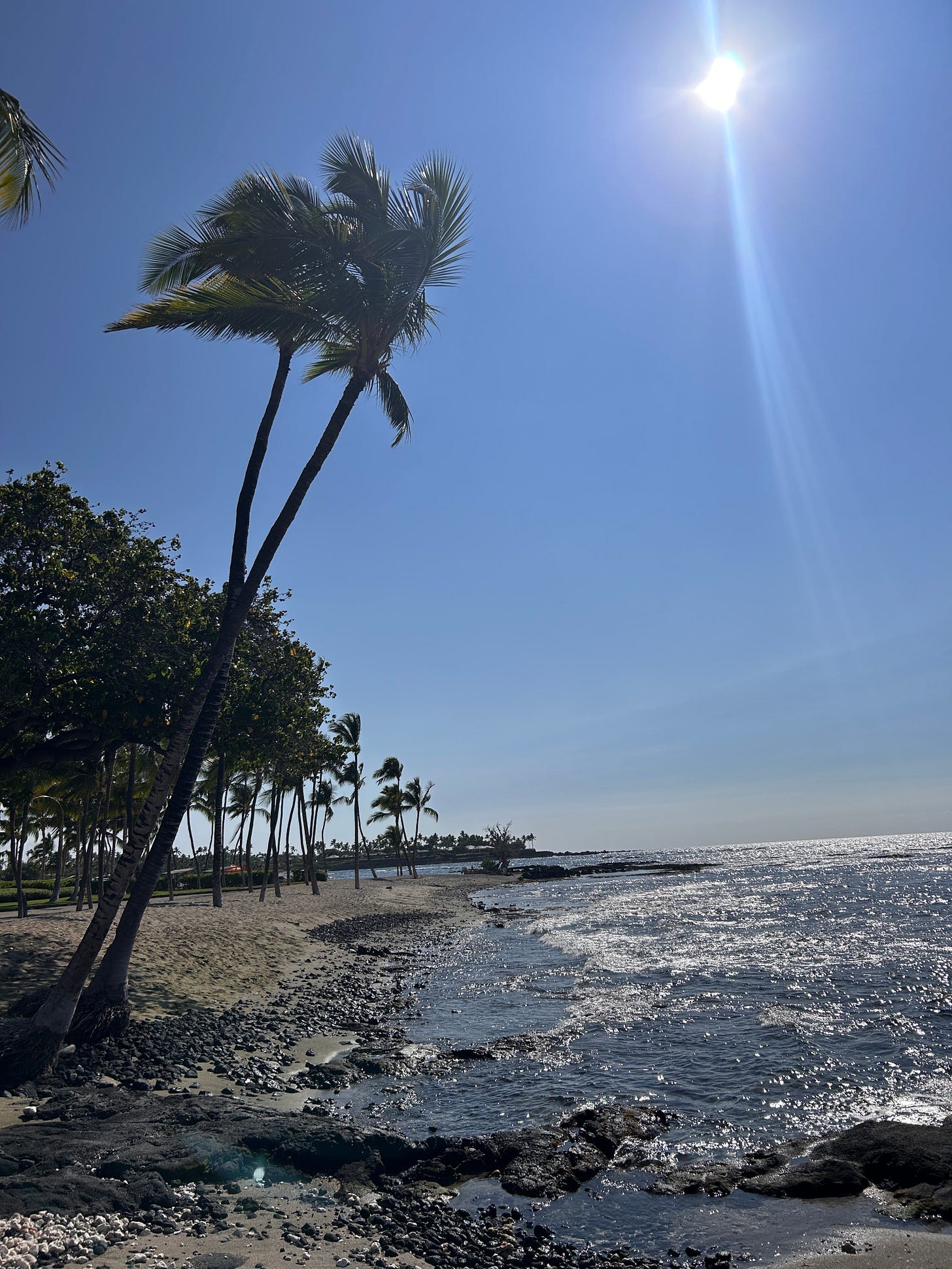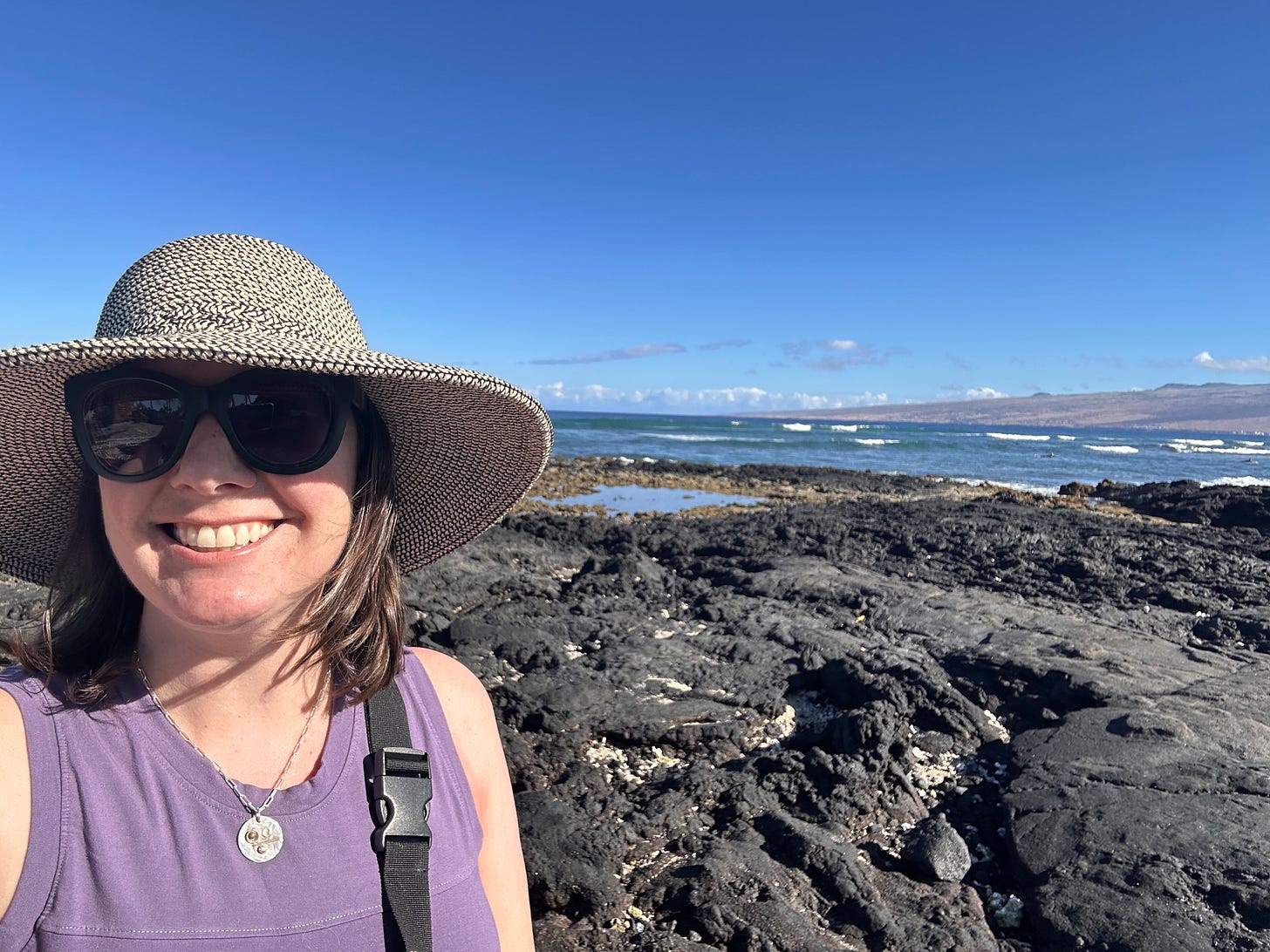Hi writer friends,
Today we have a guest essay about the tangled dance between writing, reading, and work—or not working. As we enter vacation season, I’m thinking about how writers need be out in the world, having experiences to write about. But we also need lots of time to write. We need real vacations from the work, too. And is it really a vacation if we’re searching for stories the whole time? Or, in Maggie’s case, cramming as much reading material as possible into a carry-on? Is the pleasure of reading also the work of writing? Can we sink into a book, strictly for pleasure? Or are we, as writers, doomed to always be searching for something more?
I might be veering off into my own hang-ups here. I’m publishing this essay on the day that I nearly canceled a trip with my daughter, and now I’m scrambling to get us ready and feeling very conflicted about the work time I’m losing. But Maggie speaks to many of my hangups, and probably yours, too, in this essay about a family trip to Hawaii and a very special, annotated copy of The Triggering Town.
So, let’s get to it. Here’s what you’ll find in today’s issue of Wild Writing:
On Overpacking by Maggie Neal Doherty
Upcoming deadlines, including $700 awards for emerging writers, $1,500 project grants, a workshop on digging beneath familiar landscapes, and a residency in the high plains of Wyoming.
Events and education opportunities
In the weeds: Some words I’m tangled in this week.
If you’d like to help me pay more writers for essays like this one, consider upgrading to a paid subscription or hitting the heart up top to help spread the word. However you’re able to support, I appreciate you!
On Overpacking
By Maggie Neal Doherty
The book must have been assigned in Professor Chiarella’s fiction class, while I sat sweating in the Indiana humidity and dreaming of Hugo’s Montana. I couldn’t believe my luck: I’d have an opportunity on my trip to peer back at my younger self, and rediscover a part of me that dreamed of being a writer.
No matter the trip, no matter the duration, I overpack. Books, not clothes.
For a five-day trip, like the one my family and I recently took for spring break to Hawaii’s Big Island, I packed five books and about three month’s worth of backlogged New Yorkers. I’ve forgotten diapers, flip flops, and sunscreen on past trips, but I never forget books.
As a writer and a voracious bookworm, I can’t help but overestimate my reading goals. I also harbor the fear that somehow I will plow through all my reading material and find myself in a foreign situation: having nothing to read. What if I’m forced to download an e-book onto my phone, or read the in-room dining and spa options at my hotel until I have the menu memorized? I’ve imagined myself going to desperate measures, stealing magazines off a lounge chair while its occupant swims.
I have rules about which books to bring and which to leave at home and I spend the week before the trip curating my selection. First, more paperbacks than hardcovers for weight reduction. Second, no signed books, no borrowed books. I like a good mix of my serious literature reads, a fun book like a mystery or romantic comedy, and then, because I harbor these warped ideas of being a writer that I must always be writing, a book on craft, even if I left my laptop at home.
Writers don’t get vacations, I tell myself. It’s precarious work as a freelance journalist and adjunct professor, and each year that I haven’t finished my book or essay collection makes me fret even more. Sure, I can take a trip but I can’t fully abandon my writing endeavors. Like exercise, it should be performed daily. (I don’t do either daily.)
This past March, as I packed the kids’ swimsuits and spare underwear, I fretted over which books to pack. However, one choice was clear: Richard Hugo’s 1979 classic on writing and poetry, The Triggering Town. A friend recommended it after she read through the first draft of my novel. “It might be helpful,” she said, “to find clarity on what your main character wants.”
I had a copy on my bookshelf, and when I went to retrieve it, pausing to flip through the pages before placing it in my stack of vacation reads, I noticed the annotations of my twenty-year-old self.
The book must have been assigned in Professor Chiarella’s fiction class, while I sat sweating in the Indiana humidity and dreaming of Hugo’s Montana. I couldn’t believe my luck: I’d have an opportunity on my trip to peer back at my younger self, and rediscover a part of me that dreamed of being a writer. I was curious: what had I underlined? What did I find fascinating about his idea about “triggering towns” that kicked off a poem or story? I wanted to wait until we arrived in Hawaii to find out.
On the flight between Seattle and Kona, I grabbed The Triggering Town from my bag and figured the long flight would be an ideal time to reacquaint myself with the book, and more importantly, my younger self who couldn’t wait to become a writer. However, I was frequently interrupted by my kids who needed more snacks or help selecting a movie to watch so I slipped the book into the seatback pocket. Our trip was just beginning as I searched through the bank of clouds obscuring the vast ocean below. I’d have other opportunities to learn what inspired that younger version of me, two decades in the past, to underline a passage or jot a quick note in the margins.
Later that afternoon, after we had checked into the hotel and changed into our bathing suits, it was time to swim in the Pacific. Before leaving the room, I decided that I’d christen the first night on the island by reading The Triggering Town. But it wasn’t in my backpack. I started digging through my suitcase, but it wasn’t there either. Perhaps I had shoved it into the kids' luggage after we landed. In minutes I had dumped all our luggage onto the cool tile floor ignoring my children’s pleas to hurry up. My fingers sorted through linen and lycra but didn’t land upon my annotated copy of The Triggering Town. Then I realized I left it on the plane.
I started to cry, sobbing to my husband that I left the book, the one I was so excited to read, the one that would not only help me with revision, but more importantly, offer a rare glimpse into who I was long before I moved to Montana, met him, and began our life together. He held me and explained to our kids that I had a very good reason to be sad. I lost something irreplaceable.
We wandered down to the beach, the bare skin on my fair arms prickling to the heat and salty breeze sweeping across the ocean. Still pouting, I stood in the water, feeling that ancient yet energized tidal pull against my ankles, and I thought about how travel is much like wave action. There’s the crash of energy that a new place delivers, immersing you in a new environment, especially if you’d dropped nearly 25 degrees in latitude. Yet, when the wave pulls back, it’s as if a new or hidden part of yourself is revealed. A you that could only be in this location: trading the sensation of cold for heat, snow for water, mountains for volcanoes. I expected revisiting The Triggering Town would be a similar experience: finding a younger version of myself in those black ink marks on the page.
I had other books to read and a handful of magazines—but I was devastated. I filed a missing claim report with the airline. The missing claim felt deeper than the paperback: I was also in search of my sense of self before Montana, marriage, motherhood.
Two decades ago I probably underlined passages in my apartment before going out to the bar on Thursday night, staying out way too late before my morning workshop with Chiarella, discussing Hugo and what triggers us to write. That version of myself, the one who marked up any book she got her hands on, had yet to travel across oceans like my current self. She expected a lot more of me as a writer and assumed that by my 40s, I’d surely have had at least one book published (a bestseller, of course). I was leading a literary life, devoted to books, writing, and teaching and that was part of her dream, though much less “best” or “selling.”
I had other books to read throughout the rest of the week but most of the time, I kept my eyes on the horizon, that thin line where sky and ocean meet, as if perhaps I’d find something else out there that could guide me. And sometimes, that line would explode into white: a humpback whale breaching the surface. Had my nose been stuck in a book, I would have missed it.
Maggie Neal Doherty is a freelance writer, opinion columnist, and book critic. Her work has appeared in The Guardian, The Los Angeles Times, The Washington Post, High Country News, and more. She also teaches writing at Flathead Valley Community College and lives with her family in Kalispell, MT.
Keep reading with a 7-day free trial
Subscribe to Wild Writing to keep reading this post and get 7 days of free access to the full post archives.




